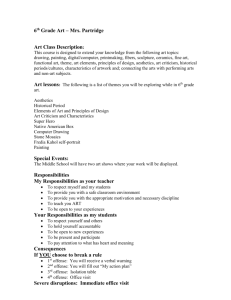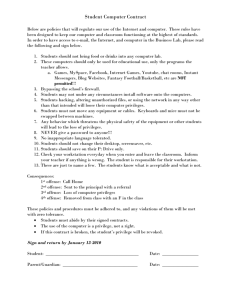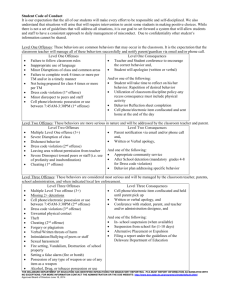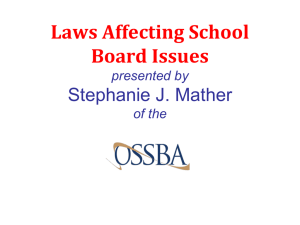montana - Bureau of Alcohol, Tobacco, Firearms and Explosives
advertisement
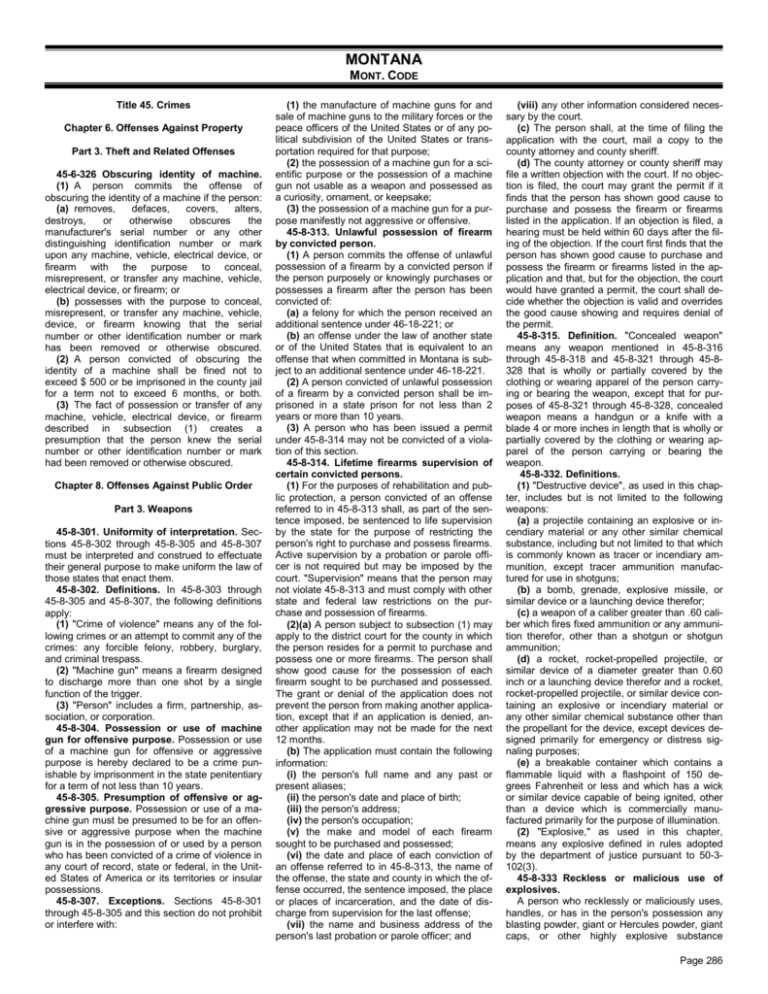
MONTANA MONT. CODE Title 45. Crimes Chapter 6. Offenses Against Property Part 3. Theft and Related Offenses 45-6-326 Obscuring identity of machine. (1) A person commits the offense of obscuring the identity of a machine if the person: (a) removes, defaces, covers, alters, destroys, or otherwise obscures the manufacturer's serial number or any other distinguishing identification number or mark upon any machine, vehicle, electrical device, or firearm with the purpose to conceal, misrepresent, or transfer any machine, vehicle, electrical device, or firearm; or (b) possesses with the purpose to conceal, misrepresent, or transfer any machine, vehicle, device, or firearm knowing that the serial number or other identification number or mark has been removed or otherwise obscured. (2) A person convicted of obscuring the identity of a machine shall be fined not to exceed $ 500 or be imprisoned in the county jail for a term not to exceed 6 months, or both. (3) The fact of possession or transfer of any machine, vehicle, electrical device, or firearm described in subsection (1) creates a presumption that the person knew the serial number or other identification number or mark had been removed or otherwise obscured. Chapter 8. Offenses Against Public Order Part 3. Weapons 45-8-301. Uniformity of interpretation. Sections 45-8-302 through 45-8-305 and 45-8-307 must be interpreted and construed to effectuate their general purpose to make uniform the law of those states that enact them. 45-8-302. Definitions. In 45-8-303 through 45-8-305 and 45-8-307, the following definitions apply: (1) "Crime of violence" means any of the following crimes or an attempt to commit any of the crimes: any forcible felony, robbery, burglary, and criminal trespass. (2) "Machine gun" means a firearm designed to discharge more than one shot by a single function of the trigger. (3) "Person" includes a firm, partnership, association, or corporation. 45-8-304. Possession or use of machine gun for offensive purpose. Possession or use of a machine gun for offensive or aggressive purpose is hereby declared to be a crime punishable by imprisonment in the state penitentiary for a term of not less than 10 years. 45-8-305. Presumption of offensive or aggressive purpose. Possession or use of a machine gun must be presumed to be for an offensive or aggressive purpose when the machine gun is in the possession of or used by a person who has been convicted of a crime of violence in any court of record, state or federal, in the United States of America or its territories or insular possessions. 45-8-307. Exceptions. Sections 45-8-301 through 45-8-305 and this section do not prohibit or interfere with: (1) the manufacture of machine guns for and sale of machine guns to the military forces or the peace officers of the United States or of any political subdivision of the United States or transportation required for that purpose; (2) the possession of a machine gun for a scientific purpose or the possession of a machine gun not usable as a weapon and possessed as a curiosity, ornament, or keepsake; (3) the possession of a machine gun for a purpose manifestly not aggressive or offensive. 45-8-313. Unlawful possession of firearm by convicted person. (1) A person commits the offense of unlawful possession of a firearm by a convicted person if the person purposely or knowingly purchases or possesses a firearm after the person has been convicted of: (a) a felony for which the person received an additional sentence under 46-18-221; or (b) an offense under the law of another state or of the United States that is equivalent to an offense that when committed in Montana is subject to an additional sentence under 46-18-221. (2) A person convicted of unlawful possession of a firearm by a convicted person shall be imprisoned in a state prison for not less than 2 years or more than 10 years. (3) A person who has been issued a permit under 45-8-314 may not be convicted of a violation of this section. 45-8-314. Lifetime firearms supervision of certain convicted persons. (1) For the purposes of rehabilitation and public protection, a person convicted of an offense referred to in 45-8-313 shall, as part of the sentence imposed, be sentenced to life supervision by the state for the purpose of restricting the person's right to purchase and possess firearms. Active supervision by a probation or parole officer is not required but may be imposed by the court. "Supervision" means that the person may not violate 45-8-313 and must comply with other state and federal law restrictions on the purchase and possession of firearms. (2)(a) A person subject to subsection (1) may apply to the district court for the county in which the person resides for a permit to purchase and possess one or more firearms. The person shall show good cause for the possession of each firearm sought to be purchased and possessed. The grant or denial of the application does not prevent the person from making another application, except that if an application is denied, another application may not be made for the next 12 months. (b) The application must contain the following information: (i) the person's full name and any past or present aliases; (ii) the person's date and place of birth; (iii) the person's address; (iv) the person's occupation; (v) the make and model of each firearm sought to be purchased and possessed; (vi) the date and place of each conviction of an offense referred to in 45-8-313, the name of the offense, the state and county in which the offense occurred, the sentence imposed, the place or places of incarceration, and the date of discharge from supervision for the last offense; (vii) the name and business address of the person's last probation or parole officer; and (viii) any other information considered necessary by the court. (c) The person shall, at the time of filing the application with the court, mail a copy to the county attorney and county sheriff. (d) The county attorney or county sheriff may file a written objection with the court. If no objection is filed, the court may grant the permit if it finds that the person has shown good cause to purchase and possess the firearm or firearms listed in the application. If an objection is filed, a hearing must be held within 60 days after the filing of the objection. If the court first finds that the person has shown good cause to purchase and possess the firearm or firearms listed in the application and that, but for the objection, the court would have granted a permit, the court shall decide whether the objection is valid and overrides the good cause showing and requires denial of the permit. 45-8-315. Definition. "Concealed weapon" means any weapon mentioned in 45-8-316 through 45-8-318 and 45-8-321 through 45-8328 that is wholly or partially covered by the clothing or wearing apparel of the person carrying or bearing the weapon, except that for purposes of 45-8-321 through 45-8-328, concealed weapon means a handgun or a knife with a blade 4 or more inches in length that is wholly or partially covered by the clothing or wearing apparel of the person carrying or bearing the weapon. 45-8-332. Definitions. (1) "Destructive device", as used in this chapter, includes but is not limited to the following weapons: (a) a projectile containing an explosive or incendiary material or any other similar chemical substance, including but not limited to that which is commonly known as tracer or incendiary ammunition, except tracer ammunition manufactured for use in shotguns; (b) a bomb, grenade, explosive missile, or similar device or a launching device therefor; (c) a weapon of a caliber greater than .60 caliber which fires fixed ammunition or any ammunition therefor, other than a shotgun or shotgun ammunition; (d) a rocket, rocket-propelled projectile, or similar device of a diameter greater than 0.60 inch or a launching device therefor and a rocket, rocket-propelled projectile, or similar device containing an explosive or incendiary material or any other similar chemical substance other than the propellant for the device, except devices designed primarily for emergency or distress signaling purposes; (e) a breakable container which contains a flammable liquid with a flashpoint of 150 degrees Fahrenheit or less and which has a wick or similar device capable of being ignited, other than a device which is commercially manufactured primarily for the purpose of illumination. (2) "Explosive," as used in this chapter, means any explosive defined in rules adopted by the department of justice pursuant to 50-3102(3). 45-8-333 Reckless or malicious use of explosives. A person who recklessly or maliciously uses, handles, or has in the person's possession any blasting powder, giant or Hercules powder, giant caps, or other highly explosive substance Page 286 through which any human being is intimidated, terrified, or endangered is guilty of a misdemeanor. 45-8-334 Possession of destructive device. (1) A person who, with the purpose to commit a felony, has in the person's possession any destructive device on a public street or highway, in or near any theater, hall, school, college, church, hotel, other public building, or private habitation, in, on, or near any aircraft, railway passenger train, car, vessel engaged in carrying passengers for hire, or other public place ordinarily passed by human beings is guilty of the offense of possession of a destructive device. (2) A person convicted of the offense of possession of a destructive device shall be imprisoned in the state prison for a period of not more than 10 years or be fined an amount of not more than $ 50,000, or both. 45-8-335 Possession of explosives. (1) A person commits the offense of possession of explosives if the person possesses, manufactures, transports, buys, or sells an explosive compound, flammable material, or timing, detonating, or similar device for use with an explosive compound or incendiary device and: (a) has the purpose to use the explosive, material, or device to commit an offense; or (b) knows that another has the purpose to use the explosive, material, or device to commit an offense. (2) A person convicted of the offense of possession of explosives shall be imprisoned in the state prison for any term not to exceed 20 years or be fined an amount not to exceed $ 50,000, or both. 45-8-336 Possession of silencer. (1) A person commits the offense of possession of a silencer if the person possesses, manufactures, transports, buys, or sells a silencer and has the purpose to use it to commit an offense or knows that another person has such a purpose. (2) A person convicted of the offense of possession of a silencer is punishable by imprisonment in the state prison for a term of not less than 5 years or more than 30 years or by a fine of not less than $ 1,000 or more than $ 20,000, or both. 45-8-337. Possession of unregistered silencer or of bomb or similar device prima facie evidence of unlawful purpose. Possession of a silencer that is not registered under federal law or of a bomb or similar device charged or filled with one or more explosives is prima facie evidence of a purpose to use the same to commit an offense. 45-8-340 Sawed-off firearm -- penalty. (1) A person commits the offense of possession of a sawed-off firearm if the person knowingly possesses a rifle or shotgun that when originally manufactured had a barrel length of: (a) 16 inches or more and an overall length of 26 inches or more in the case of a rifle; or (b) 18 inches or more and an overall length of 26 inches or more in the case of a shotgun; and (c) the firearm has been modified in a manner so that the barrel length, overall length, or both, are less than specified in subsection (1)(a) or (1)(b). (2) The barrel length is the distance from the muzzle to the rear-most point of the chamber. (3) This section does not apply to firearms possessed: (a) by a peace officer of this state or one of its political subdivisions; (b) by an officer of the United States government authorized to carry weapons; (c) by a person in actual service as a member of the national guard; (d) by a person called to the aid of one of the persons named in subsections (3)(a) through (3)(c); (e) for educational or scientific purposes in which the firearms are incapable of being fired; (f) by a person who has a valid federal tax stamp for the firearm, issued by the bureau of alcohol, tobacco, and firearms; or (g) by a bona fide collector of firearms if the firearm is a muzzle loading, sawed-off firearm manufactured before 1900. (4) A person convicted of the offense of possession of a sawed-off firearm shall be fined not less than $ 200 or more than $ 500 or be imprisoned in the county jail for not less than 5 days or more than 6 months, or both, upon a first conviction. If a person has one or more prior convictions under this section or one or more prior felony convictions under a law of this state, another state, or the United States, the person shall be fined an amount not to exceed $ 1,000 or be imprisoned in the state prison for a term not to exceed 5 years, or both. 45-8-344. Use of firearms by children under fourteen prohibited - exceptions. It is unlawful for a parent, guardian, or other person having charge or custody of a minor child under the age of 14 years to permit the minor child to carry or use in public any firearms, except when the child is accompanied by a person having charge or custody of the child or under the supervision of a qualified firearms safety instructor or an adult who has been authorized by the parent or guardian. 45-8-345. Criminal liability of parent or guardian - prosecution. (1) Any parent, guardian, or other person violating the provisions of 45-8-344 shall be guilty of a misdemeanor. (2) The county attorney, on complaint of any person, must prosecute violations of 45-8-344. 45-8-351. Restriction on local government regulation of firearms. (1) Except as provided in subsection (2), no county, city, town, consolidated local government, or other local government unit may prohibit, register, tax, license, or regulate the purchase, sale or other transfer (including delay in purchase, sale, or other transfer), ownership, possession, transportation, use, or unconcealed carrying of any weapon, including a rifle, shotgun, handgun, or concealed handgun. (2)(a) For public safety purposes, a city or town may regulate the discharge of rifles, shotguns, and handguns. A county, city, town, consolidated local government, or other local government unit has power to prevent and suppress the carrying of concealed or unconcealed weapons to a public assembly, publicly owned building, park under its jurisdiction, or school, and the possession of firearms by convicted felons, adjudicated mental incompetents, illegal aliens, and minors. (b) Nothing contained herein shall allow any government to prohibit the legitimate display of firearms at shows or other public occasions by collectors and others, nor shall anything contained herein prohibit the legitimate transportation of firearms through any jurisdiction, whether in airports or otherwise. 45-8-360. Establishment of individual licensure. In consideration that the right to keep and bear arms is protected and reserved to the people in Article II, section 12, of the Montana constitution, a person who has not been convicted of a violent, felony crime and who is lawfully able to own or to possess a firearm under the Montana constitution is considered to be individually licensed and verified by the state of Montana within the meaning of the provisions regarding individual licensure and verification in the federal Gun-Free School Zones Act. 45-8-361. Possession or allowing possession of weapon in school building – exceptions - penalties - seizure and forfeiture or return authorized - definitions. (1) A person commits the offense of possession of a weapon in a school building if the person purposely and knowingly possesses, carries, or stores a weapon in a school building. (2) A parent or guardian of a minor commits the offense of allowing possession of a weapon in a school building if the parent or guardian purposely and knowingly permits the minor to possess, carry, or store a weapon in a school building. (3)(a) Subsection (1) does not apply to law enforcement personnel. (b) The trustees of a district may grant persons and entities advance permission to possess, carry, or store a weapon in a school building. (4)(a) A person convicted under this section shall be fined an amount not to exceed $500, imprisoned in the county jail for a term not to exceed 6 months, or both. The court shall consider alternatives to incarceration that are avail-able in the community. (b)(i) A weapon in violation of this section may be seized and, upon conviction of the person possessing or permitting possession of the weapon, may be forfeited to the state or returned to the lawful owner. (ii) If a weapon seized under the provisions of this section is subsequently determined to have been stolen or otherwise taken from the owner's possession without permission, the weapon must be returned to the lawful owner. (5) As used in this section: (a) "school building" means all buildings owned or leased by a local school district that are used for instruction or for student activities. The term does not include a home school provided for in 20-5-109. (b) "weapon" means any type of firearm, a knife with a blade 4 or more inches in length, a sword, a straight razor, a throwing star, nunchucks, or brass or other metal knuckles. The term also includes any other article or instrument possessed with the purpose to commit a criminal offense. Part 4. Montana Street Terrorism Enforcement and Prevention Act 45-8-406. Supplying of firearms to criminal street gang. (1) A person commits the offense of supplying firearms to a criminal street gang if the person purposely or knowingly supplies, sells, or gives possession or control of any firearm to another, and the person has actual knowledge that the other person will use the firearm to commit an offense enumerated in 45-8-405 while actively participating in any criminal street gang whose members engage in a pattern of criminal street gang activity. (2) Subsection (1) does not apply to a person who is convicted as a principal to the offense page 287 committed by the person to whom the firearm was supplied, sold, or given. (3) A person convicted of the offense of supplying firearms to a criminal street gang shall be imprisoned in the county jail for a term not to exceed 1 year or be fined an amount not to exceed $1,000, or both. [Current through all 2009 legislation] page 288

